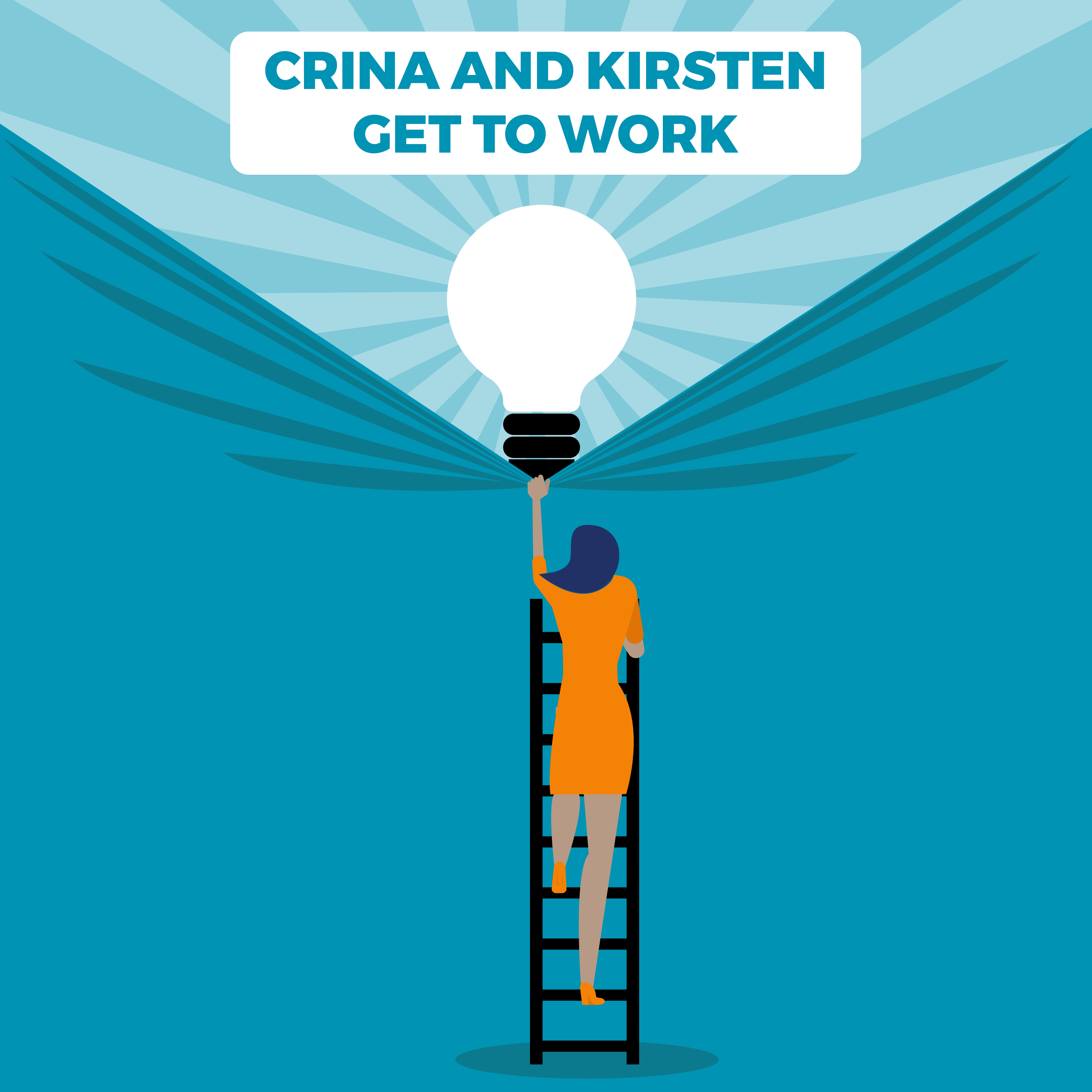Crina and Kirsten Get to Work

We have one single mission: Help women find ease, meaning and joy at work and in life. We use our experiences as business owners, entrepreneurs, mentors and inspirational leaders to explore topics that all working women care about: shitty bosses; smashing the patriarchy; balancing work and life; navigating change and getting what you want! We guarantee that you will be entertained and inspired... promise!
Episodes
Episodes



Friday Jun 02, 2023
Mind Your Manners...Or Not
Friday Jun 02, 2023
Friday Jun 02, 2023
Do you abide by the social code at work or do you balk at such conventions? Do you see manners as a construct developed by the patriarchy or a set of rules that we should happily abide by? Are you offended by the need to be a “good girl,” or do you see the value of manners in maintaining social order? Join the conversation as we explore this very interesting debate.
SHOW NOTES
Manners are behaviors and etiquette is the social code or cultural values of a community. According to the anonymous blogger, peaceigive, the word “etiquette” comes to us from French and it referred to a physical ticket that explained the social rules in the court of Louis XIV. And of course, you only got a copy of the rules if you were “in.”
While manners and etiquette are fundamentally about kindness and respect, manners and etiquette can also be racist, ableist and sexist – and tools of exclusion. Manners and etiquette in the workplace present an opportunity, as Judith “Miss Manners” Martin says, to maintain personal dignity, to balance cooperation and competitiveness, to take responsibility and remain flexible, to be attentive and discreet as well as honest and tactful Manners and etiquette can be empowering to create a culture of inclusiveness.
Tune in to hear about the specifics of introductions, who pays, who buys gifts, remote work and all of the fabulous opportunities we have in the workplace to use manners and etiquette to create more ease, meaning and joy at work.
GOOD READS
School of Disruptive Etiquette
Psst… Manners Are Racist and Ableist Too. – PEACE I GIVE



Friday May 19, 2023
When Your Coworker is Sad
Friday May 19, 2023
Friday May 19, 2023
Coworkers who are grieving, sad and experiencing trauma might appear scattered, distand, disorganized, short tempered, anxious, intense and teary. So how do we create more ease, meaning and joy at work by showing up and supporting them, and ourselves?
SHOW NOTES
The first step is the scariest because there are so many unknowns, but it is the check in - check in with your co-worker about how they are doing. The reason this can feel scary is because you do not know what the reaction with be - you could get tears, a brick wall, anger - you just cannot be sure how someone is doing until you ask - but being open allows us to do the next important step, which is to hold space, which means we just need to pay attention and listen. When we are holding space, telling someone how they do or should or will feel is often not helpful. Once we have an understanding of how someone is going, then we can start to sort through whether we should just be with our co-worker or we should make an offer to help. Listen is as Crina and Kirsten sort through these issues and the specifics.
MORE GOOD READS
The Best Way to Comfort Someone When They're Sad
How to Offer Support to a Grieving Colleague (hbr.org)
When Someone You Love Is Upset, Ask This One Question
Four Ways Hugs Are Good for Your Health



Friday May 05, 2023
Managing Change That You Don’t Control
Friday May 05, 2023
Friday May 05, 2023
Sometimes we find ourselves on the receiving end of change, but how to manage the change we do not control? And how do we deal with the emotions that come with all of this change?
SHOW NOTES
It is helpful to know ourselves - always, but particularly with change. In 1962, E.M. Rogers created the Diffusion of Innovation Theory - how change happens. Innovators are the creators of change. Early adopters are people in leadership who embrace change. Early majority are those of us who are not in leadership, but are more willing than most to adopt a change. Late majority are the folks who are reluctant to change, but will do it once most others have. Laggards, are those who are reluctant to change - and just really do not like it. Knowing who we are on this scale gives us a starting point to address the impacts of change.
When change happens, there can be things that frustrate us, worry us and create problems for us. Change can create just about any negative emotion or experience. McKinsey created the 7 S’s, which is really an organizational tool, but serves as an excellent evaluation tool:
1 - is your problem or concern one of strategy - does the change impact the organization’s plan for building and maintaining a competitive advantage over competitors?
2 - is your problem or concern one of structure - does the change impact how workers are organized and who reports to who?
3 - is your problem or concern with systems - does the change impact how work is performed?
4 - is your problem or concern with values - does the change impact the core values or work ethic of the organization?
5 - is your problem or concern one of style - does the change impact leadership style?
6 - is your problem or concern one of staffing - does the change impact the ability of the humans to do their work?
7 - is your problem or concern one of skills - does the change impact the skills and competencies of the organization’s workers?
Analyzing your concern or problem through this lens provides a framework to better manage our responses.
Once we understand our problem or concern, there are strategies to manage those reactions:
Acknowledge the change. When change is happening in the workplace, acknowledge it and our responses in a non-judgmental way.
Excavate your fears and concerns. Writing down these fears and considering what you will do about each can diffuse our reactions.
Be flexible.
Be part of the change. Any time we can be involved, we have an opportunity to shape change.
Communicate. It is important to articulate problems and concerns to leadership.
Reduce Stress and anxiety. Of course!
Have a sense of meaning. Understanding the value of our work can help us navigate change
GOOD READS:
(40) 10 Tips for Dealing with Change Positively in Your workplace | LinkedIn
McKinsey 7-S Framework - Making Every Part of Your Organization Work in Harmony
Diffusion of Innovation Theory



Friday Apr 21, 2023
Interviews–Ready, Set, Get that JOB!
Friday Apr 21, 2023
Friday Apr 21, 2023
Interviews are your first change to make a lasting impression. What you say, what you wear, and how (or whether) you answer the questions can make or break your chances at landing that dream job. You don’t want to miss this master class!
SHOW NOTES
Looking for a job can be discouraging, but remember, 52% of applicants get 1 or 2 interviews after submitting 10 applications. 34% get none and 14% get 3 or more interviews. It usually takes at least ten applications to get a job.
The first step to interviewing is preparation, which will take far longer than the interview. And we assume we have the interview because our resumes are great, our cover letters do not contain typos and our social media presence reflects what we want to communicate to the world, including a potential employer.
Research the company and the industry, check into what their employees on LinkIn are posting, find people who know about the company and ask questions. What would you like to know about the company or working there that you did not find out in your research?
Find a personal connection to the company and let that person know you have an interview. Candidates that are referred and have personal connections are more likely to be hired.
Practice answering questions - no, really, don’t just consider what your answers would be, but actually say it out loud - preferably with someone you trust. We should be prepared to answer the difficult questions about ourselves - be ready to explain gaps in our resume, a termination, a criminal conviction . . . we should be ready to talk about the challenging parts of our resume and work - and sometimes personal - history. Practice with a friend or mentor.
And we have arrived at the big day - be early, comfortable, rested, hydrated, and nourished.
It is okay to be nervous, it shows you care, but focusing on our nervousness can be distracting.
Here are some helpful hints: answer the questions and be honest in your answers (this is BIG!); take notes if it is helpful to stay on track; have copies of your resume, references, writing samples etc in case those are needed; ask the questions that arose during your research. And feel free to be funny and add humor - funny people are more likely to be hired.
GOOD READS
Tips for a Successful Interview
Strategies of Effective Interviewing
30 Mind-Blowing Interview Statistics to Get You Going in 2023 (legaljobs.io)



Friday Apr 07, 2023
Your Beliefs Shape the Way You Experience the World
Friday Apr 07, 2023
Friday Apr 07, 2023
What you decide is “true” in the world, shapes how you experience every single situation you encounter. It also impacts your happiness, health and your job. New research helps explain why this is true; why we interpret situations in such vastly different ways; AND how to change your outlook.
SHOW NOTES
Crina and Kirsten find it endlessly entertaining to consider why people arrive at certain conclusions. We have all been in a situation where we have said something and two people who have heard it interpret what we say entirely differently - and maybe even differently than we intended. This is true of so many things - i.e. is the email my boss sent supportive or is it a threat. Kirsten is consistently surprised by employees who think they are being fired and pack up their office when their boss has no intention of firing them. Why is this?
At first, our hosts thought that it was about family or origin and experiences, but new research suggests our beliefs may be more about what we decide is true versus what we actually experience as true. Our hosts are quick to point out that trauma and adverse childhood experiences are not addressed in this research - at least not yet - and we should be cautious about applying this new research to those situations.
Our beliefs about whether the world is a good place stem from three main questions:
Is the world safe?
Is the world beautiful and interesting?
Do I have the ability to influence the world around me?
Jer refers to these beliefs as Primal Beliefs - and they shape our experience of the world. Our duo explores what each of these questions is about. If the world is not safe, then it is unsafe. If the world is not beautiful and interesting, then it is dull and boring. If we do not have the ability to interact and influence our world, then it is just mechanistic and our efforts are futile. These beliefs do not necessarily control everything we do, but research indicates these beliefs nudge our experiences and fill in the gaps when we do not have enough information.
The research is exciting because it concludes that experiences do not necessarily shape belief. For example, people who live in relatively wealthier neighborhoods do not see the world as more abundant than people who live in poorer neighborhoods - and the same is true for safety. People who live in safer neighborhoods do not believe the world is safer than people who live in more dangerous neighborhoods. The experiences of these people do not match their beliefs.
This research is new and there is more coming out in the next several years. It is an exciting proposition that we can decide what beliefs we hold - and even work to increase our positive beliefs to improve our experience with the world.



Friday Mar 24, 2023
Friday Mar 24, 2023
The US Surgeon General has called-out workplace mental health and wellness as a public health priority! Woot Woot! And a huge shout out to their new Framework for workplace mental health and well-being!
Here is the link:
Workplace Mental Health & Well-Being — Current Priorities of the U.S. Surgeon General
SHOW NOTES
And don’t forget to read Surgeon General Murthy’s letter introducing the framework. He discusses his parents’ experience in coming to America and what work meant to them. It meant connection and meaning - and helped them thrive - and provided for their family. Sounds a lot like ease, meaning and joy!
The framework starts by citing the statistics on workplace mental health. The vast majority of people are experiencing a mental health symptom due to stress at work, yet most are unwilling to seek help, which means people suffer.
Dr. Murthy then lays out the five components of workplace mental health and wellness.
Protection from Harm: Human needs: Safety and Security
Protection from harm covers everything from adequate ergonomic equipment, safety in performing tasks such as lifting, clean air and water, sufficient light - and being free from impacts to our psychological safety, such as bullying and intimidation and discrimination.
Connection & Community Human needs: Social Support and Belonging
Creating connections, relationships and networks at work offers all kinds of support to employees and can mitigate the tsunami of loneliness that is facing many Americans. Creating a culture of belonging supports mental health and wellness.
Work-Life Harmony Human needs: Autonomy and Flexibility
The work-life harmony component of mental health and well-being at work acknowledges that most workers have more responsibilities than their work. Employers need to see workers as whole people with responsibilities outside of work, whether it is time needed for routine physical and mental health care, an unexpected family issue that requires urgent attention, or for regular time and space for rest, exercise, educational pursuits, and hobbies. Workers also need as much flexibility and autonomy as possible as to how their work is done, which helps them balance work on personal obligations.
Mattering at Work Human needs: Dignity and meaning
Workers want to know they matter and they make a difference. This is about compensating workers in a way that acknowledges and communicates value as well as building a culture of gratitude and recognition.
Opportunity for Growth Human Needs: Learning and Accomplishment
Lastly, workers need opportunities for learning, accomplishment, and growth to support mental health and well-being in the workplace. Workers become more optimistic about their abilities and more enthusiastic about contributing to the organization. This can be education, mentoring, training or advancement opportunities.
Kudos to Dr. Murthy for bringing the issue of workplace mental health and wellness to the forefront of important health issues in the United States.



Friday Mar 10, 2023
Friday Mar 10, 2023
Creative activities such as painting, writing, drawing wood-working, playing music, cooking and landscaping will make you healthier, reduce stress, help you problem solve and boost your happiness. Creativity also appears to make you more generous toward others and easier to be around!
SHOW NOTES
Creativity is an activity that occurs by connecting the activities that occur in various parts of our brains. Anna Abraham, a neuroscientist and author of The Neuroscience of Creativity said in Scientific American that one of the things that’s unique about creativity in the brain is that it draws from both sides. This is actually what makes creativity unique compared to other brain functions, like language or motion, that originate in a specific region.
In a 2018 study researchers determined creativity is higher in people who are able to connect the parts of our brain that provide imagining with decision making and focus and the ability to switch among these functions. Usually brain activity doesn’t occur much between these networks, but in highly creative brains, interactions were strong.
There are many studies supporting the link between creativity and happiness. See the links below. Participants who undertook a creativity priming task that required them to recall three situations where they had behaved creatively before completing another creativity task, reported a higher level of subjective well-being after the task than the control group. In a study of women with stage 1 and 2 breast cancer, creative arts therapy intervention enhanced psychological well-being by decreasing negative emotional states and enhancing positive ones. The authors of a 2019 article concludes creative individuals tend to be better problem-solvers, which in turn lowers their stress levels and promotes happiness.
Creativity is also good for your performance at work and it is good for those around you. A new study by San Francisco State University organizational psychologist Kevin Eschleman and colleagues found employees who pursue creative activities outside of work find these activities boost their performance on the job. Creativity again makes us better problem solvers, and it also appears to make us more generous with our co-workers in terms of lending a hand.
The most effective way to increase creativity to make space for it, whether journaling as part of a morning routine or wood working in the evening after dinner. If you cannot carve out the space try to build it into existing activities - maybe doodle when taking notes or focusing on creativity when preparing your evening meal.
Doing routine activities in a different way can also fuel creativity, such as taking a different route to work or using your non-dominant hand or refraining from swearing - these kinds of changes “mix it up” in your brain.
10 Studies Show Why Creativity and Happiness are Linked (trackinghappiness.com)
3 science-backed reasons having a hobby will help your career (cnbc.com)
Why Do We Treat Women's Creativity Differently? | Psychology Today
How To Be More Creative And Boost Happiness: 6 Ways To Get Inspired (forbes.com)
The Creativity Bias against Women - Scientific American



Friday Feb 24, 2023
The Entitled (white, male) Co-Worker...How to Spot em and How to Deal
Friday Feb 24, 2023
Friday Feb 24, 2023
Entitlement is an excessive self-regard and a belief in the automatic right to certain, usually privileged, treatment…hmmm…who does that remind you of?
SHOW NOTES
White male entitlement exists because society has a dislike, contempt or ingrained prejudice against women - also known as misogyny. It is difficult not to reach this conclusion when we look at statistics about women’s health, women at work, women as parents, the economic status of women, women in elected and administrative governmental offices etc . . .. In each of the areas, the results for women are inferior to those of men. Kate Mann, assistant professor of philosophy at Cornell University, writes misogyny is “the system that operates within a patriarchal social order to police and enforce women’s subordination and to uphold male dominance.” Misogyny is like a shock collar used to keep dogs behind an invisible fence, misogyny, Mann argues, and aims to keep women—those who are well trained as well as those who are unruly—in line.” Mann asserts that misogyny is not directed at every woman, but rather is a system in which women exist. Mann distinguishes sexism, which she defines as the ideas society has about women, with misogyny, which is the patriarchal system of enforcement of those ideas.
The misogynistic culture allows male entitled to thrive. Male entitlement can be as simple as men acting like the master of the castle and treating women as there to serve and pamper. It can be seen in the policing of what women wear lest they leave a man unable to control his sexual desires. We see it at work, much as we do at home, with the delegation of certain kinds of tasks to women, the frequency and duration that men speak - even the learned incompetence that we sometimes see in men who believe they are not required to be competent. And this kind of behavior in the workplace negatively impacts job satisfaction and leads to burnout both for the entitled and for their co-workers.
This is a problem for white males to resolve. And it requires white males to be aware of their behavior - their expectations, how much they speak, how much room they take up. It requires active listening and a desire to give support as much or not more than they receive it. Ideally, men call other men on entitled behavior.
Women can set good boundaries about what they are willing to do and not do and what behavior they are willing to be on the receiving end and what behavior they are not willing to tolerate.
ADDITIONAL RESOURCES
Kate Manne
Being a good listener is an important learned skill.
What do we mean by male entitlement and male privilege? - SAFER (a resource to help Australian churches deal with domestic and family violence) (saferresource.org.au)
Healthy Entitlement: The Key to Gender Equity in the Workplace — Composure - The Art of Executive Presence

Crina and Kirsten Get to Work
Crina and Kirsten dish on all things related to women and work. Through engaging conversations and witty banter, they will inspire you to seize your power and create meaningful, joyous, fun and rewarding work in their business podcast. While exploring motivational podcast topics such as authenticity, shitty bosses, friends and negotiation, Crina and Kirsten lift up women and show the patriarchy “the hand” and “the finger”.








